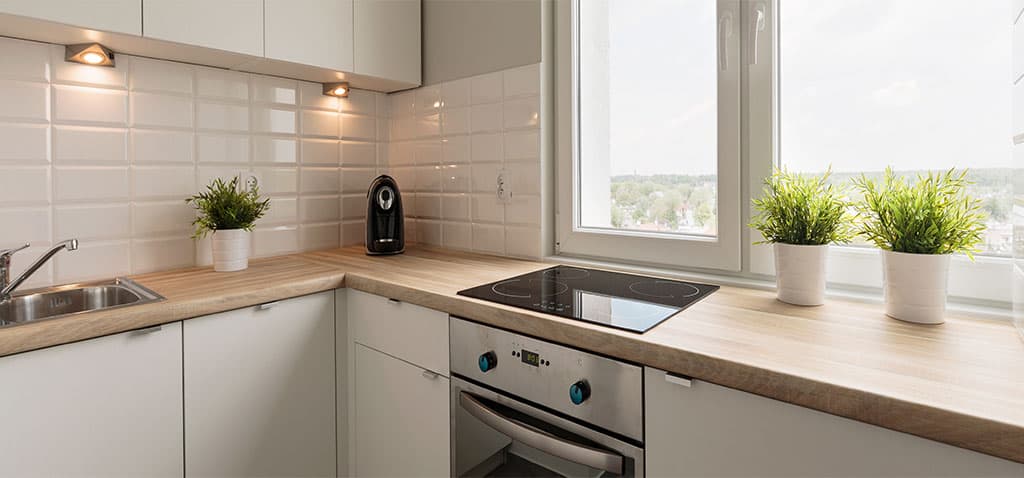If you are attempting to install your kitchen worktops then there are a few things you need to know such as do you need a jig to install kitchen worktops and do you mitre square edge worktops this guide will help answers all your questions plus guide you to installing your kitchen worktops
Do you need a jig to install kitchen worktops, this depends on the style of the worktop, if you have a bullnose worktop then you will need to jig to cut a mason’s mitre, but you don’t need a worktop jig to install kitchen worktops using joining bars or square edge worktops
Table of Contents
What Is A Mason’s Mitre
A mason’s mitre was initially designed for bullnose worktops this is because cutting both worktops straight would create a gap at the front of the worktop where the bullnose started this was overcome by cutting the worktop straight and then turning the end of the cut into a 45-degree angle to create a tight joint.
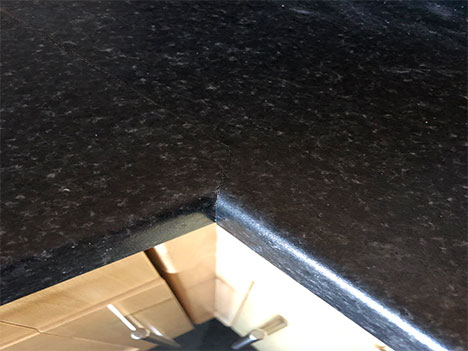
Can You Cut A Mason’s Mitre By Hand
Cutting a mason’s by hand is a hard thing to do as you will need to make sure that you are cutting on the line that you have marked however with that being said it is not impossible to cut a mason’s mitre by hand is just not recommended.
Do You Mitre Square Edge Worktops
When it comes to cutting and joining square edge worktops, these are somewhat different to bullnose worktops as you don’t need to mitre a square edge worktop this is due to them being square, and you can just butt them together
When it comes to wooden worktops tops, you can just butt them together, seal the end with silicone or join mitre sealer and join them with worktop bolts
When it comes to square edged laminate worktops, this can be different.
If you have a fully laminate front edge to the worktop, then you will need to measure the depth of the worktop and then to use a chisel remove the laminate from edge
If you don’t remove the laminate front edge, you will most likely have a poor and untight join
Once you have removed the front laminate, then you can just butt them together sealing them with silicon or mitre seal and tighten with worktop bolts
How Do You cut and Join Worktops With A Jig
How to cut Kitchen worktops with a jig you will need to follow these steps
- To cut the female join, you will need to turn the worktop face down
- Measure the width of the worktop
- Insert the guide into the jig in the holes marked on the jig for the female cut
- Push the guide up to the front edge of the worktop and clap in place
- Set up your router with a ½” shank bit and a 30mm guild
- For the first cut set the router only to cut 5mm into the worktop
- Slowly cut the worktop going down 5mm for every pass
- Remove the claps and clean of the back edge of the join with fine sandpaper
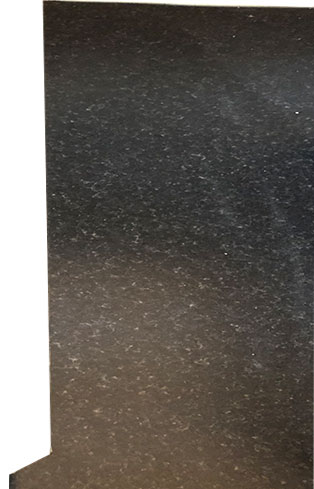
For the male cut, you will follow the same process except the worktop should be face up this is because routers cut from left to right and if you cut the male side of a worktop joined with the worktop face down you will damage the worktop.
Before cutting the male joint always place the female worktop on the kitchen cabinets and place the other worktop over the top and mark underneath to make sure your worktop is the right length
How to join a worktop with a jig you will need to follow these steps
- Turn the worktop face down
- Place the worktop jig onto the worktop
- Insert the guides into the assigned slots for worktop bolts
- The bolt holes should be between 28mm and 32mm deep depending on the depth of your worktops
- Clap the jog to the worktop to hold in place
- Set up your router with a ½” shank bit and a 30mm guild
- For the first cut set the router only to cut 5mm into the worktop
- Slowly cut the worktop going down 5mm for every pass
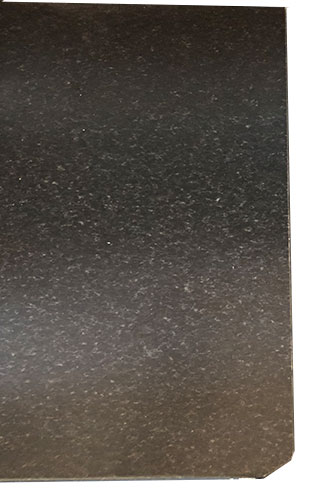
The worktops are now ready to be installed onto your kitchen cabinets
Once you have cut both worktops place the worktop with the female cut in place and lay the male worktop on the top.
Firstly dry-fit the worktops to make sure they are both going to fit, and the join looks good.
If the worktop join is right, then lay the bolts into the female worktop cut-outs and then using silicone, run and small bead on the front edge and across the top of the male joint
Slowly line up both worktops and push them together now you can start to tighten the bolts
Start with tightening the front bolt so that it starts to pull both the worktops together but don’t overtighten.
If you find the join not lining up at the front, adjust the worktop with spacers against the wall and tap them together using a rubber hammer.
Repeat the process until all the bolts are tight, then clean of the silicone seal
What Is The Best Worktop Jig
There are many different brands and manufacturers of kitchen worktop jigs, with the most common and best worktop jigs made by Trend most professional kitchen fitters will have a Trend KWJ7900
This is because it is a hard-wearing and reliable and a solid 12mm thick jig that cuts both sides of the joint and the worktop bolts
This jig is handed for both left and righthand corners and has prest set fixed lengths of 400mm, 500mm, 550mm, 600mm, 616mm, 650mm, 650mm, 700mm, and 900mm wide worktops
There are three open-ended bolt recesses for 150mm bolts
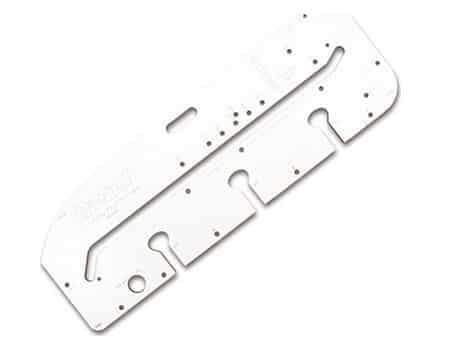
What Is The Best Router To Cut Worktops
As a plumber and kitchen fitter, I have myself used, several different routers and I find that the Dewalt DW625EKT 12” plunger router is by far the best and most dependable.
When cutting worktops, you need a good router as they can be challenging depending on the type of worktop you are cutting; therefore, the best router to cut worktops would be the Dewalt DW625EKT 12” plunge router
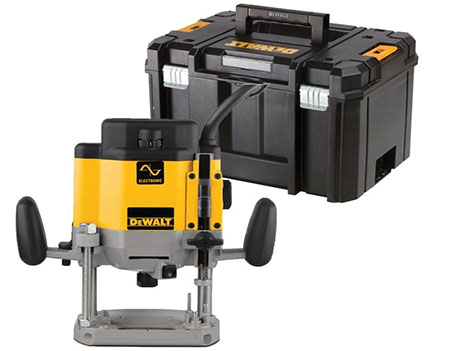
What Router Bit Do You Need To Cut Worktops
To cut a kitchen worktop, you will require an excellent new route bit such as a Trend two-flute worktop jig route cutter that is ½” and which is for abrasive materials such as chipboard, MDF, plywood and hard plastics the two-flute router bit gives you an excellent clean finish and fine cut and has a plunger head on the end of the router bit to ensure and clean first cut
How Do You Put Kitchen Worktop Together Without A Mitre
If you have opted not to mitre your worktops, then the best way to put kitchen worktops together with a mitre is to join both sections of worktops with joining strips or joining bars.
To install a joining strip to your worktops, you will need to:
- Cut each strip to length
- Screw the strip to the female side of the worktop
- Put silicone on the inside before joining the male worktop

How Far From A Sink Should A Worktop Joint Be
When planning for the fitting of kitchen worktops and locations of your sink and hob you need to think about the way the worktops are being joined to allow for the installation of the bolts
It is the best practice that you make sure when joining worktops together that you allow 100mm space away from any appliance cut out so that the worktop bolts do not interfere with the installations of a sink, hob or any other appliance that is cut into a worktop.
For more information on how to install a kitchen sink and tap I have a guide on that for you
How Much Does It Cost To Install Kitchen Worktops
The price for installing worktops can vary depending on the materials and style of worktop that needs to be fitted so when it comes to pricing for kitchen worktop installation, and you need to think about these.
The cost to install kitchen worktops that are solid wood the price will be between £75 and £100 per sq meter however the cost to install laminate worktops are much cheaper and will cost between £25 and £50 per sq meter
For bullnose laminate kitchen worktops the price may increase to allow for extra cutting and therefore allow an additional £20 and £30 on top of the per sq meter price
For square-edge laminate kitchen worktops, the price should not change as this is the most straightforward style of worktops to install. If you are installing granite or quartz worktops then the cost will be dramatically higher and the installation costs are usually built into the cost of buying the granite or quartz however if you purchase it separately, and just what it installed then you will be looking at a price between £150 and £200 per sq meter

